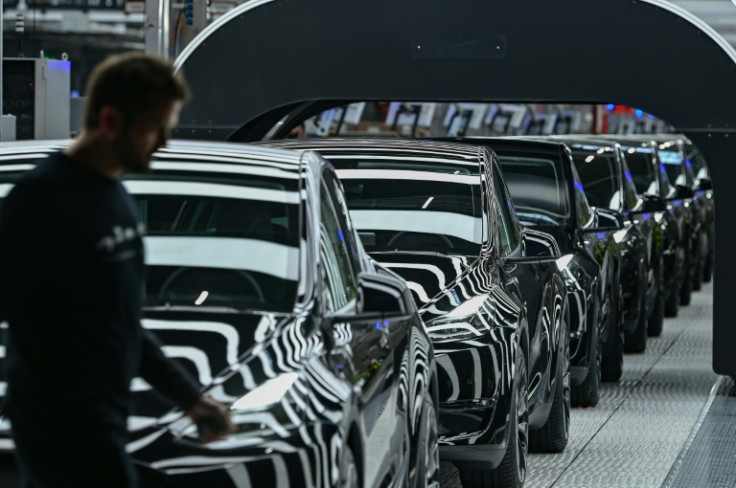Tesla's German Plant Halts Production After Suspected Arson Attack

Tesla halted production at its German factory Tuesday after assailants allegedly set fire to high-voltage lines nearby, cutting power to the US electric carmaker's only European plant, the company and authorities said.
Emergency services were called to reports of a burning electricity pylon southeast of Berlin in the early hours, in the area the factory is located, and firefighters extinguished the blaze.
But it knocked out power to the Tesla factory -- which opened in 2022 after a long, drawn-out process -- as well as surrounding villages, prompting police to launch an investigation into suspected arson.
Environmental activists opposed to a planned expansion of the factory run by Elon Musk's company recently set up a camp near the plant, but police refused to be drawn on whether there was a link between the group and the blaze.
Michael Stuebgen, interior minister for Brandenburg state, said that "if initial findings are confirmed, this is a perfidious attack on our electricity infrastructure".
"Thousands of people have been cut off from their basic supply and put in danger. The rule of law will react to such an act of sabotage with the utmost severity."
But he cautioned against "premature speculation" about who might be responsible.
Tesla said in a statement that the production facilities in Gruenheide were in a "safe state" after the shutdown, and workers had been sent home.
"We are in close contact with the authorities and of course (electricity supplier) Edis. We are currently unable to say when production can be expected to resume," it said.
It is the latest problem to hit the factory.
In January, most production was halted at the site for two weeks due to a shortage of parts following shipping delays caused by Yemeni rebel attacks in the Red Sea, a vital trade route.
The plant started production in 2022 following an arduous two-year approval and construction process dogged by administrative and legal obstacles.
Tesla has been hoping to expand the site by 170 hectares (420 acres) and boost production up to one million vehicles annually to feed Europe's growing demand for electric cars and take on rivals who are shifting away from combustion engine vehicles.
But the plans have raised the hackles of local residents, who voted against the project in a non-binding ballot last month.
After the vote, Tesla said it might have to rethink the plans.
"We recognise that the citizens of Gruenheide have concerns in connection with the planned expansion of the site," the company said.
Last week, environmental activists opposed to the plans set up a camp in tree tops near the factory, in an area of forest that the carmaker will have to raze if the expansion goes ahead.
As well as deforestation, the activists are concerned an expansion would threaten local drinking water supplies.
Tesla also has plenty of headaches elsewhere.
In Sweden, the carmaker is facing a strike that has lasted more than four months over its refusal to sign a collective wage agreement.
And in January, the company reported lower fourth-quarter operating profits despite higher revenues, while warning of slower volume growth this year.
© Copyright AFP 2025. All rights reserved.





















